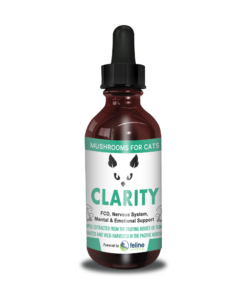When we talk to cat parents about enrichment, we often hear the same thing: “My cat just doesn’t want to play.” How to help cats that don’t play is more important than we realized. We’ve even struggled with this ourselves – until a feline behaviorist gave us a game-changing perspective: “A cat that doesn’t want to play is lying.”
What she meant is that cats that don’t play often don’t feel secure or confident enough to be a cat. That made total sense when we saw this same dynamic with our Pooh Bear. And she was right – with the right support, even the most hesitant kitty can rediscover their inner hunter.
First, Rule Out Health Issues
If your cat used to enjoy playtime and suddenly stopped, schedule a veterinary check-up. Pain, illness, or discomfort can all cause sudden chances in behavior and activity levels. Once medical issues are ruled out, it’s time to focus on behavioral enrichment.
Why Play Matters
Cats are natural-born hunters. Stalking, pouncing, and chasing are instinctual. Being able to exercise these instincts is vital to their mental and physical health. Without play, cats may become bored, anxious, or even depressed.
How To Help Cats That Don’t Play
→ Create a Safe Space
Cats play more when they feel secure. Offer hiding spots, cozy shelves, boxes, or vertical space where they can explore freely and feel safe being themselves.
→ Use the Right Toys
Different cats like different styles of play. Some love feather wands or flying toys, others prefer things that skitter across the floor. Rotate toys every few days to keep things fresh without buying new ones constantly.
→ Stick to a Schedule
Cats thrive on routine. Try daily play sessions at dawn and dusk—when their natural hunting instincts kick in.
→ Make It Rewarding
Use treats, praise, or petting when they show interest. Positive reinforcement helps build trust and encourages more play over time.
→ Try One-on-One Time
In multi-cat households, carve out solo time with each cat. A quiet room and undivided attention can work wonders for confidence. In fact, these confidence building sessions are what changed Pooh Bear’s life… and ours.
Final Thought
Cats that don’t play aren’t lazy – they’re often just misunderstood. With patience, creativity, and a little consistency, you can help your cat rediscover the joy of play – and strengthen your bond in the process.




Recent Comments